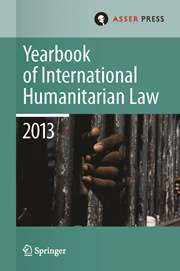Article contents
Adjudicating Armed Conflict in Domestic Courts: The Experience of Israel's Supreme Court
Published online by Cambridge University Press: 15 August 2011
Extract
Until relatively recently, dealing with terror groups and terror activities had been viewed by most nations primarily as an act of law enforcement, regulated by domestic criminal law. Accordingly, in most instances the same codes that applied to ‘ordinary’ criminal acts were applied to acts of terrorism. Such crimes were investigated by law enforcement agencies which were also responsible for the apprehension of terrorists. An alleged terrorist would be prosecuted in a regular civilian court of law for crimes such as murder, destruction of property and assault. Specialized terrorism-related offenses were also codified but continued to be drawn from domestic criminal law. When reviewed by the courts, the legitimacy of such counter-terrorism measures was assessed by judges in light of familiar domestic criminal and constitutional legal standards.
- Type
- Articles
- Information
- Copyright
- Copyright © T.M.C. Asser Instituut and the Authors 2010
- 2
- Cited by


